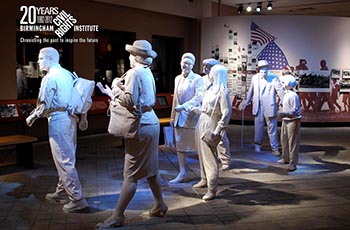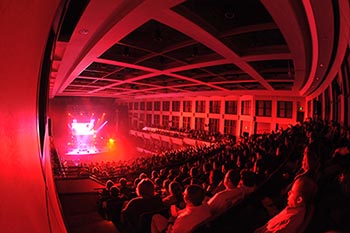In 1963, the world watched as a series of events unfolded in Birmingham, Ala., that showed the best and worst of humanity and helped bring forth desegregation in the United States. Fifty years later, that same city has launched another series of events — commemorative events to celebrate progress, as well as remember and honor those who fought, and even died, so freedom would triumph.
 |
| Birmingham Civil Rights Institute |
Once again, the world is watching Birmingham.
In 1963, children were held in jail for days, Rev. Martin Luther King, Jr. penned his famous “Letter from the Birmingham Jail” and four little girls were killed in church by a bomb planted by the Ku Klux Klan. In the end, what happened in Birmingham has been largely credited with building the pressure needed to bring about the Civil Rights Act of 1964 that made segregation illegal.
50 Years Forward — a partnership among city officials, businesses, nonprofits and universities to commemorate the seminal events of the U.S. Civil Rights Movement — offers locals and visitors a year of concerts that feature gospel choirs and Grammy winners, visual exhibitions that pay homage to that time through paintings and photographs, galas to honor the foot soldiers and freedom riders, plays that tell the stories behind the story and much more.
In a city that was once the face of segregation, people of all colors are finding history, entertainment, perspective and inspiration by celebrating 50 years of progress together.
The downtown Civil Rights District was the stage for much of the Movement activities. Today, it is home to the 58,000 square foot Birmingham Civil Rights Institute where images, music and interviews tell the story of what happened during the Movement. The historic Sixteenth Street Baptist Church, the site where on Sept. 15, 1963, four little girls were killed by a bomb planted by the Ku Klux Klan, opens its door to visitors from around the world. The Birmingham Civil Rights Heritage Trailleads visitors along the steps taken by the foot soldiers Geographic photographs and dramatic cut-outs in the designs of the signs adds to the rich experience.
 |
| UAB's Alys Stephens Performing Arts Center |
The University of Alabama at Birmingham (UAB), considered a mecca of diversity that boasts a population that mirrors the global community, has invited a host of renowned speakers, authors, artists and educators to pay tribute and examine the racial, legal, economic and artistic effects of the Movement.
“Here, on what is one of our nation’s most diverse campuses, the commemoration of the events of 1963 takes on a special meaning,” Birmingham Mayor William Bell said. “Here at UAB, where the four little girls were taken to the emergency room after that bombing; here, where a hospital, cafeterias and academic programs were integrated deftly and without violence.”
50 Years Forward at UAB will feature a series of important speakers, including Martha Nussbaum, one of the nation’s most important human rights philosophers, and Eric Foner, the Pulitzer-prize winning historian. In September, Bob Adelman, the photographer who traveled with Martin Luther King Jr. will bring his civil rights photography to UAB’s Visual Arts Institute. The events are free and open to the public.
UAB will present the world premiere of a new work for orchestra and choir, “A More Convenient Season,” co-commissioned by UAB’s Alys Stephens Performing Arts Center (ASC) and philanthropist Tom Blount. The work, by composer Yotam Haber, will premiere on Sept. 21, and will be performed by the Alabama Symphony Orchestra and Sixteenth Street Baptist Church youth choir. The work will incorporate archival film, photographs and historical sound recordings from the Civil Rights Movement in Alabama, with gospel melodies, hymns and protest songs. For more information and a comprehensive listing of events and attractions, visit www.fiftyyearsforward.com.
 |
| Birmingham |
The city itself is a perfect backdrop to welcome a world of visitors to the commemoration. Known for award-winning restaurants, visitors feast on authentic Southern cuisine from hole-in-the-wall gems to upscale James Beard award finalists. The city landscape offers parks and play areas for family gatherings. At places like Sloss Furnaces, where steelworkers once toiled, there is now historical recognition, arts classes, events and tours. Red Mountain Park and Trails, which once was home to miners and their families, now has miles of hiking and biking trails as well as a zip-line tours for the adventurous tourist or resident.
Just a short drive from Atlanta, Jackson and Nashville, a trip to Birmingham is a perfect one-day or even weekend family getaway. The Birmingham-Shuttlesworth International Airport operates 110 flights daily to 39 airports in 36 cities, with 18 non-stop flights to cities including Chicago, Baltimore, Charlotte, Miami, Houston, Detroit, St. Louis, New Orleans, Las Vegas and New York. Daytrips from Birmingham include: The University of Alabama in Tuscaloosa, where Governor George Wallace famously stood in the schoolhouse door; Selma, the site of Bloody Sunday; and Montgomery, where the Rosa Parks Museum is a must-see.
Many Birmingham-area hotels offer commemoration-themed packages. The historic Tutwiler Hotel features an audio tour of Birmingham history with 42 photographs including civil rights heroes Rev. Fred Shuttlesworth, King and the Rev. Ralph Abernathy. The hotel also has a Birmingham Civil Rights Institute package that includes tickets to the museum.